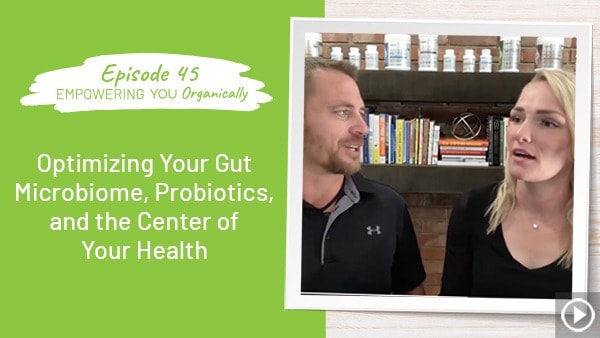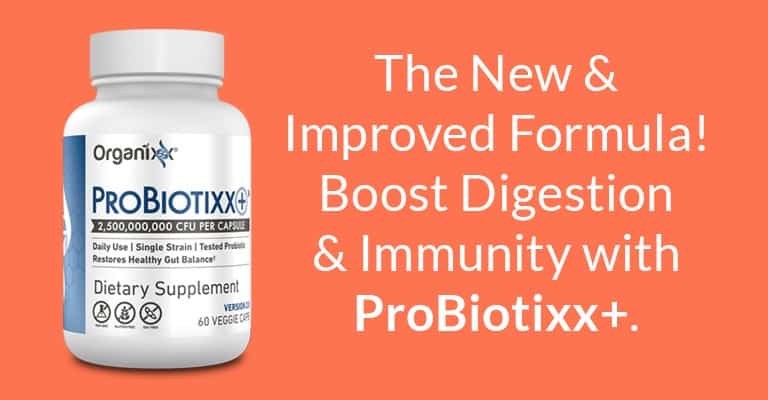Empowering You Organically – Season 6 – Episode 45
Title: Optimizing Your Gut Microbiome, Probiotics, and the Center of Your Health
Hosts: Jonathan Hunsaker, TeriAnn Trevenen
Guest: none
Description: What is the center of your health? The gut. Tune in to learn the quiet signals your body sends to let you know something is off in your microbiome. We also dive into why probiotics are helpful and how to get them naturally and with supplementation. And be sure to listen for our simple, yet solid, tips you should use while shopping for a probiotic supplement.
* * *
The Gastrointestinal Microbiota and Why You Should Care About What That Is
- Probiotics, along with a host of other microorganisms are so crucial to your health that researchers have compared them to a newly-recognized organ.
- Your microflora, a term used to describe the bacteria, fungi, viruses, and other microbes that make up your microbial inner ecosystem impact far more than your digestive tract.
- It’s the center of our body in the sense that it impacts our immune system, and our immune system impacts everything that goes on in our body and how healthy we are.
Some of The Areas Where Gut Bacteria Plays A Key Role
- Behavior – A study published found that mice lacking in gut bacteria behaved differently than normal mice, engaging in what would be referred to as high-risk behavior. This altered behavior was accompanied by neurochemical changes in the mouse brain.
- Your gut serves as a second brain – It produces more of the neurotransmitter serotonin, which is known to have a positive influence on your mood than your brain does.
- Emotions are negatively affected by an unbalanced microbiota.
- Mental illness
- Gene expression – A probiotic-rich beverage has been shown to influence the activity of hundreds of your genes to help them express in a positive disease-fighting way
- Epigenetics – you may have certain genes, you may have certain DNA, but the expression of those genes can be highly-influenced by your lifestyle choices.
- Diabetes – According to a study from Denmark, bacterial population in the gut of diabetics differs from non-diabetics. According to the authors, the results of their study indicate that type 2 diabetes in humans is linked to compositional changes in intestinal microbiota. A healthy diet, which is low in sugar and grains, high in whole, raw foods and fermented foods, allows your beneficial gut bacteria to flourish.
- Autism – Establishment of a normal gut flora in the first 20 days or so of life is critical in appropriate maturation of your baby’s immune system. Hence, babies with abnormal gut flora have compromised immune systems and are particularly at risk for developing ADHD, learning disabilities, and autism, especially if they are vaccinated before restoring balance to their gut flora.
- Obesity – Probiotics may help fight obesity. Restoring your gut flora is therefore a crucial consideration if you’re struggling to lose weight.
- You don’t have to be obese either, or you could be a very thin person who’s extremely unhealthy when it comes to your gut as well.
How to Know If You Should Take A Probiotic
- You can’t seem to lose weight.
- You’ve got a lot of belly fat, and no matter what you try, you can’t get rid of it.
- You may have digestive issues, bloating, cramping, and gas after eating, constipation, diarrhea.
- Your skin is itchy or broken out.
- You crave sugar, refined or processed foods.
- You feel blue or moody.
- You feel tired during the day and aren’t sleeping soundly at night.
- You seem to catch every bug going around.
Antibiotics
- Affects your body’s own ability to fight and get rid of sickness, bugs, disease in your body.
- If you’re going to take an antibiotic, you should definitely follow it up with a probiotic so that you can get your gut health back in check, because it definitely will throw it off.
- The antibiotic doesn’t care if it’s a good bacterium or a bad bacterium.
Getting Your Gut Right (TeriAnn)
- I think getting your gut right takes a lot of work and a lot of effort and a lot of information.
- There are so many amazing things out there.
- There’s a test called, I believe it’s Viome, where you can get your gut tested to know what’s optimal for your gut.
- I had to reset my whole system.
- I did juice cleanses.
- I did an elimination diet.
- I detoxed my body.
- Juices, detox baths, all those things
- I slowly started adding supplements back.
“How Should I Take supplements?”
You should start by taking one at a time and see how that impacts you. If that’s great, then go to the next one. But if you take two at a time, how do you know how each one is benefiting you?
Fermented Foods
- One of the most natural and effective ways to get your gut back to a healthy place and continue on that journey of keeping your gut healthy.
- Kombucha
Benefits of Fermented Foods
- Some fermented foods are outstanding sources of essential nutrients, such as vitamin K2, which helps prevent arterial plaque buildup and heart disease.
- Optimizing your immune system – 80 percent of your immune system is actually located in your gut.
- Detoxification – fermented foods are some of the best chelators available.
- The beneficial bacteria in these are highly potent detoxifiers capable of drawing out a wide range of toxins and heavy metals.
- There’s a natural variety of microflora – as long as you vary the fermented and cultured foods you eat; you’ll get a much wider variety of beneficial bacteria than you could ever get from just one supplement.
- Cost-effectiveness – because it contains so many of the good beneficial bacteria, just adding a little bit into your meal, at every single meal that you have, can have long-term health effects in a positive way on your health, all the different bacteria that you’re exposed to.
How to Know If A Probiotic Supplement Is Good
- Refrigeration – The challenge is, is the supply chain from where the probiotic is created, and encapsulated, or bottled, staying cool all the way until it hits the health food store or until it hits your front doorstep. The chances of that staying refrigerated from the place of manufacturing until it gets in your hands, it’s slim to none.
- It contains freeze-dried cultures that are clinically proven to wipe our digestive pain.
- Freeze-drying is the process of removing all of the water out of the substance.
- The best probiotics are freeze-dried, which keeps them dormant until they make contact with the water again. As soon as the probiotics get hydrated, they spring back to life.
- Make sure that they are using high-quality advanced plant-based vegetarian capsules.
- Old-school probiotic capsules dissolve and release live flora or good bacteria in the wrong place. On average, probiotic capsules take about 5-6 minutes to dissolve, and they release the live flora in your stomach, where most get killed instantly by your stomach acid. So, they never get to your colon where they’re needed.
- Plant-based capsules help reduce oxidation and keep more bacteria alive. They also have a thicker coating than traditional capsules. This means that a higher percentage of the live probiotics will survive your stomach acid and reach your intestines.
- Make sure that you have a single-strain probiotic.
- Many manufacturers combine the wrong strains. They mix together a bunch of strains and never analyze where the strains may compete and work against one another.
Probiotixx+
- NEW! Improved formula.
- Freeze-dried.
- A specific strain, lactobacillus plantarum.
* * *
Subscribe to Empowering You Organically
Never miss an episode!
APPLE PODCASTS SPOTIFY GOOGLE PODCASTS
–
Episode 45 – Optimizing Your Gut Microbiome, Probiotics, and the Center of Your Health





